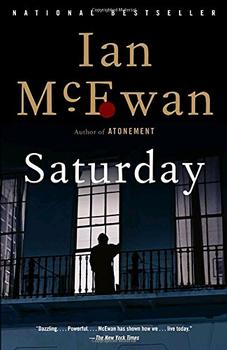Summary | Excerpt | Reading Guide | Reviews | Beyond the Book | Readalikes | Genres & Themes | Author Bio

One
Some hours before dawn Henry Perowne, a neurosurgeon, wakes to find himself already in motion, pushing back the covers from a sitting position, and then rising to his feet. It's not clear to him when exactly he became conscious, nor does it seem relevant. He's never done such a thing before, but he isn't alarmed or even faintly surprised, for the movement is easy, and pleasurable in his limbs, and his back and legs feel unusually strong. He stands there, naked by the bed—he always sleeps naked—feeling his full height, aware of his wife's patient breathing and of the wintry bedroom air on his skin. That too is a pleasurable sensation. His bedside clock shows three forty. He has no idea what he's doing out of bed: he has no need to relieve himself, nor is he disturbed by a dream or some element of the day before, or even by the state of the world. It's as if, standing there in the darkness, he's materialised out of nothing, fully formed, unencumbered. He doesn't feel tired, despite the hour or his recent labours, nor is his conscience troubled by any recent case. In fact, he's alert and empty-headed and inexplicably elated. With no decision made, no motivation at all, he begins to move towards the nearest of the three bedroom windows and experiences such ease and lightness in his tread that he suspects at once he's dreaming or sleepwalking. If it is the case, he'll be disappointed. Dreams don't interest him; that this should be real is a richer possibility. And he's entirely himself, he is certain of it, and he knows that sleep is behind him: to know the difference between it and waking, to know the boundaries, is the essence of sanity.
The bedroom is large and uncluttered. As he glides across it with almost comic facility, the prospect of the experience ending saddens him briefly, then the thought is gone. He is by the centre window, pulling back the tall folding wooden shutters with care so as not to wake Rosalind. In this he's selfish as well as solicitous. He doesn't wish to be asked what he's about—what answer could he give, and why relinquish this moment in the attempt? He opens the second shutter, letting it concertina into the casement, and quietly raises the sash window. It is many feet taller than him, but it slides easily upwards, hoisted by its concealed lead counterweight. His skin tightens as the February air pours in around him, but he isn't troubled by the cold. From the second floor he faces the night, the city in its icy white light, the skeletal trees in the square, and thirty feet below, the black arrowhead railings like a row of spears. There's a degree or two of frost and the air is clear. The streetlamp glare hasn't quite obliterated all the stars; above the Regency façade on the other side of the square hang remnants of constellations in the southern sky. That particular façade is a reconstruction, a pastiche—wartime Fitzrovia took some hits from the Luftwaffe—and right behind is the Post Office Tower, municipal and seedy by day, but at night, half-concealed and decently illuminated, a valiant memorial to more optimistic days.
And now, what days are these? Baffled and fearful, he mostly thinks when he takes time from his weekly round to consider. But he doesn't feel that now. He leans forwards, pressing his weight onto his palms against the sill, exulting in the emptiness and clarity of the scene. His vision—always good—seems to have sharpened. He sees the paving stone mica glistening in the pedestrianised square, pigeon excrement hardened by distance and cold into something almost beautiful, like a scattering of snow. He likes the symmetry of black cast-iron posts and their even darker shadows, and the lattice of cobbled gutters. The overfull litter baskets suggest abundance rather than squalor; the vacant benches set around the circular gardens look benignly expectant of their daily traffic—cheerful lunchtime office crowds, the solemn, studious boys from the Indian hostel, lovers in quiet raptures or crisis, the crepuscular drug dealers, the ruined old lady with her wild, haunting calls. Go away! she'll shout for hours at a time, and squawk harshly, sounding like some marsh bird or zoo creature.
From Samurai William by Giles Milton. Copyright 2003. All rights reserved. No part of this book may be reproduced in any form without written permission from the publisher, Farrar, Straus and Giroux.




The dirtiest book of all is the expurgated book
Click Here to find out who said this, as well as discovering other famous literary quotes!
Your guide toexceptional books
BookBrowse seeks out and recommends the best in contemporary fiction and nonfiction—books that not only engage and entertain but also deepen our understanding of ourselves and the world around us.